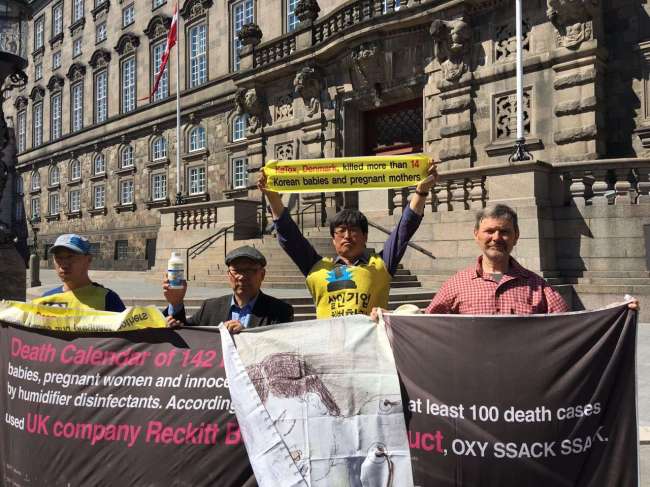Danish chemical company KeTox -- which allegedly supplied PGH to Korean company Butterflyeffect -- has denied any links to the firm, a civic group working with the victims of toxic humidifier disinfectants said Thursday.
The Danish company denied any business deals with Butterflyeffect in a meeting with representatives of the victims in Denmark on Sunday, according to Choi Ye-yong of the Asian Citizen’s Center for Environment and Health.
The now closed company’s former CEO Frede Damgaard reportedly said that all they had sent to Korea was a 40 ml PGH sample for agricultural use, along with a materials safety data sheet, to an unnamed Korean company in 2007. In a taped conversation with Choi, he argued that the chemicals used in Butterflyeffect’s brand Cefu -- one of the sterilizers blamed for the deaths since 2011 -- were from China.
Cefu was sold from 2009 to 2011 through online malls often used by mothers. It was advertised as an “environmentally friendly product from Denmark.”
 |
Victims and members of civic groups hold a rally in front of the Danish Parliament on Monday, local time. (Yonhap) |
The brand is blamed for 14 deaths and health problems among 41 more people who reported side effects from its use to the government in 2014.
“I’m 99 percent sure that the company got its ingredients from China,” said Damgaard. But he could not specify the name of the company.
Butterflyeffect is no longer in business and the prosecution has sought an arrest warrant for its former head.
“(What they imported from China) was not PGH, but PHMG,” he added.
This goes against what the Korea Centers for Disease Control and Prevention had identified in 2011 regarding the list of chemicals contained in Cefu.
PGH is a powerful sterilizing agent compared to other chemicals. Denmark has officially banned the use of PGH and PHMG for industrial or agricultural use since 2012, after a warning from the World Health Organization.
As of 2016, KeTox has no production facilities in Denmark, as the firm went bankrupt in 2012 and closed down last year.
Choi of ACCEH called for a thorough probe into KeTox’s claims and other allegations linked to international companies.
“About 68 percent of victims who died from humidifier sterilizers were known to have used products from European manufacturers such as Reckitt Benckiser and Tesco in U.K. and KeTox in Denmark,” Choi said.
“The prosecution should, as soon as possible, start an international probe into these firms and summon related officials from Denmark and China,” added Choi.
By Kim Da-sol (
ddd@heraldcorp.com)








![[Today’s K-pop] Blackpink’s Jennie, Lisa invited to Coachella as solo acts](http://res.heraldm.com/phpwas/restmb_idxmake.php?idx=644&simg=/content/image/2024/11/21/20241121050099_0.jpg)